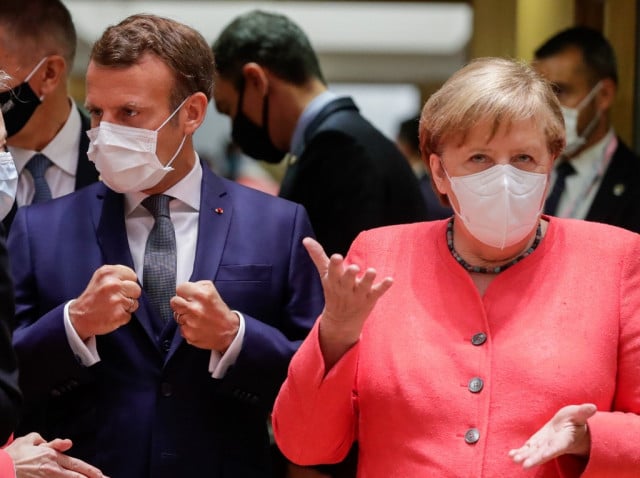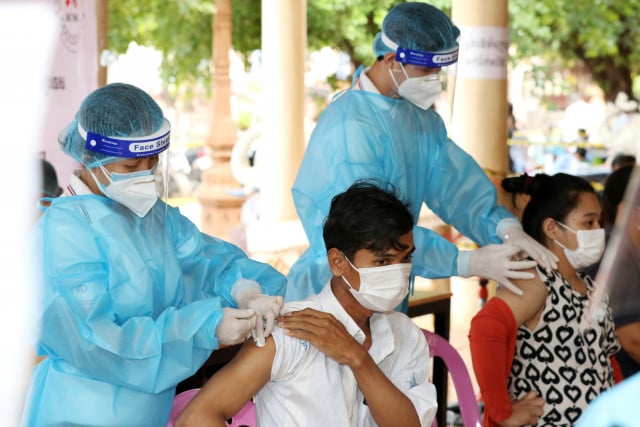EU meets on virus rescue plan as India passes one million cases

- Agence France-Presse
- July 18, 2020 1:36 AM
Brussels, Belgium | EU leaders met face to face Friday to try to rescue Europe's economy from the ravages of the coronavirus pandemic, as India became the third country to record one million cases, joining Brazil and the United States.
The virus has now killed more than 590,000 people and infected over 13,800,000 as it continues to surge across the globe despite months of unprecedented measures aiming to stop its spread.
The pandemic has also shattered economies worldwide, and the mood was sombre as European Union leaders met in person for the first time in five months hoping to overcome divisions about a planned 750-billion-euro ($855 billion) stimulus package.
German Chancellor Angela Merkel said there were still large differences between the EU nations so she expected "very, very difficult negotiations".
French President Emmanuel Macron described it as a "moment of truth".
"It's our European project which is in play here," Macron warned before meeting Dutch Prime Minister Mark Rutte, who leads a group of northern European countries holding out against handing cash to southern nations without strict conditions.
- 'Societal responsibility' -
Elsewhere COVID-19 is spreading at an ominous pace, with India surpassing one million infections just a day after Brazil's number topped two million.
And the United States, which has recorded more cases than both countries combined with over 3,560,000, on Thursday posted yet another record number of new infections in one day with 68,428.
The top US infectious disease specialist, Anthony Fauci, called on America's youth to take the virus more seriously.
"My message to young people is consider your responsibility to yourself -- but also your societal responsibility," he said in an interview with Facebook chief Mark Zuckerberg.
"Because the sooner we put this down, the sooner we're going to get back to normal and you'll be able to freely have fun, go to the bars go with the crowds, but not now. Now is not the time to do that."
Lockdowns have imposed on millions of people in India, where more than 600 are dying every day.
India's main hotspots had previously been the megacities of Mumbai and New Delhi, but smaller cities and rural areas -- where 70 percent of Indians live -- have recently begun to raise the alarm.
The coastal tourist region of Goa is the latest Indian state to go under lockdown, imposing a three-day shutdown and a nightime curfew until August 10.
With per capita spending on health care among the lowest in the world, India's hospitals are reeling.
"The fear of catching the infection is very real as I am in a high-risk zone almost round the clock," Showkat Nazir Wani, a doctor in an intensive care unit at Sharda Hospital just outside the capital New Delhi, told AFP.
"It's not going to go away till a vaccine comes... I have to keep fighting and trying to save every single life."
After two studies this week raised hopes for a potential vaccine, the United States, Britain and Canada accused Russian-linked hackers of targeting labs in their countries conducting coronavirus vaccine research.
The three governments pointed the finger at the Kremlin, saying that the hacking group involved was "almost certainly" linked to Russian intelligence.
Moscow rejected the accusations as "groundless".
- New restrictions -
In the US, the state of Florida has become the country's new epicentre as well as a key battleground in a partisan-tinged national fight over reopening schools.
Florida's governor Ron DeSantis has insisted schools reopen next month despite his state registering 156 COVID-19 deaths and nearly 14,000 new infections on Thursday alone.
The Republican governor's demand mirrors that of President Donald Trump, who has threatened to cut federal funding for schools that refuse to open their doors.
Despite fears of a second wave of the virus, Prime Minister Boris Johnson said Britain could return to normality by Christmas, as a study revealed that Europe's hardest-hit nation may be overestimating its death toll.
But authorities in many other countries have been reimposing lockdowns in the hopes of heading off a second wave.
On Friday Israel said stores, markets and other public spaces would be closed on weekends as its number of cases surges.
Residents of Spain's second city Barcelona were urged to stay home as the regional government ordered the closure of cinemas, theatres and nightclubs and banned gatherings of more than 10 people.
And in China -- where COVID-19 first emerged late last year -- flights were curtailed and public transport shut down in Urumqi, the capital of the far-western Xinjiang region, after new infections were detected.
Authorities in Australia's second-biggest city Melbourne meanwhile warned that its lockdown could become even tougher after a record 423 new cases were registered there on Friday.
© Agence France-Presse















